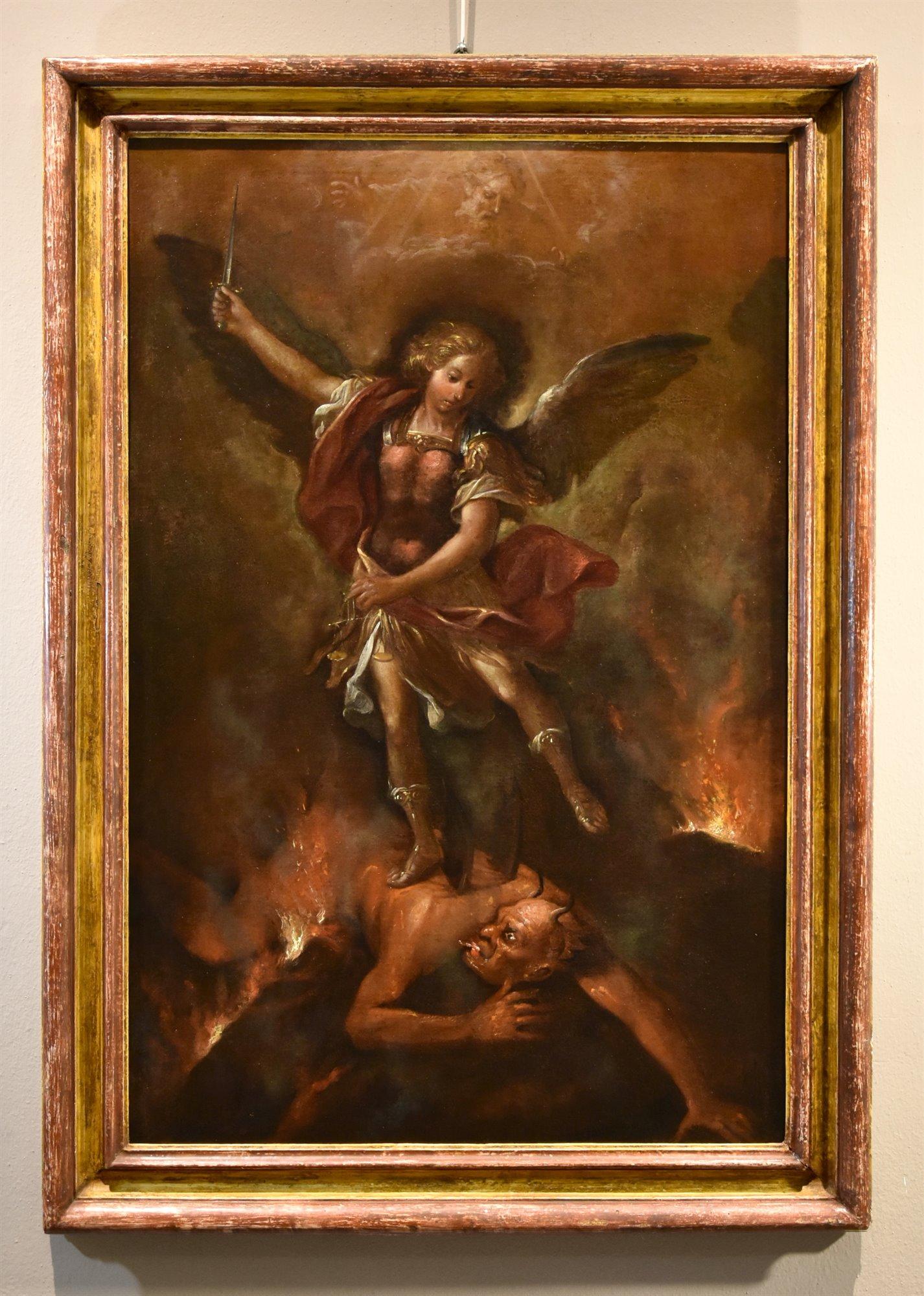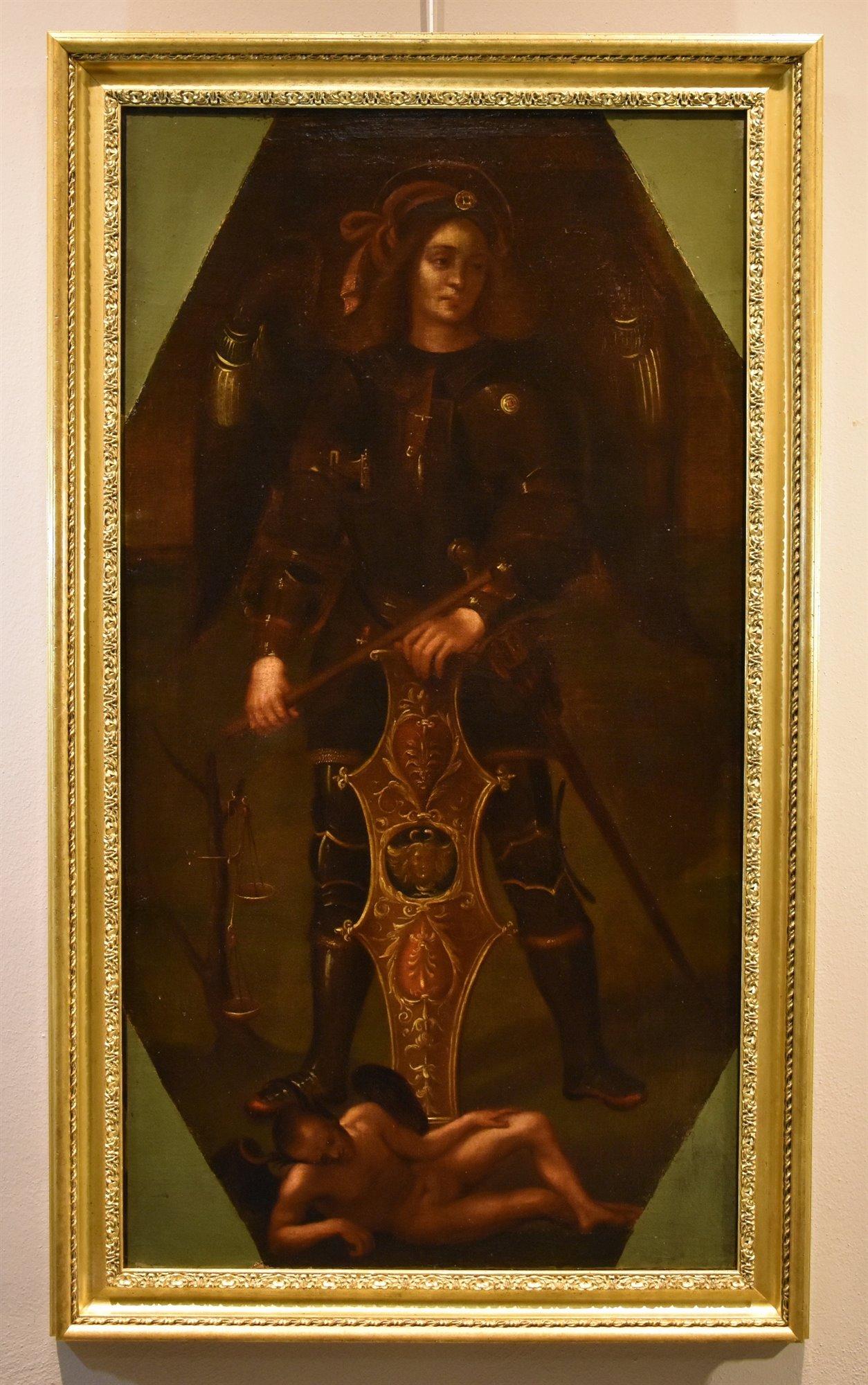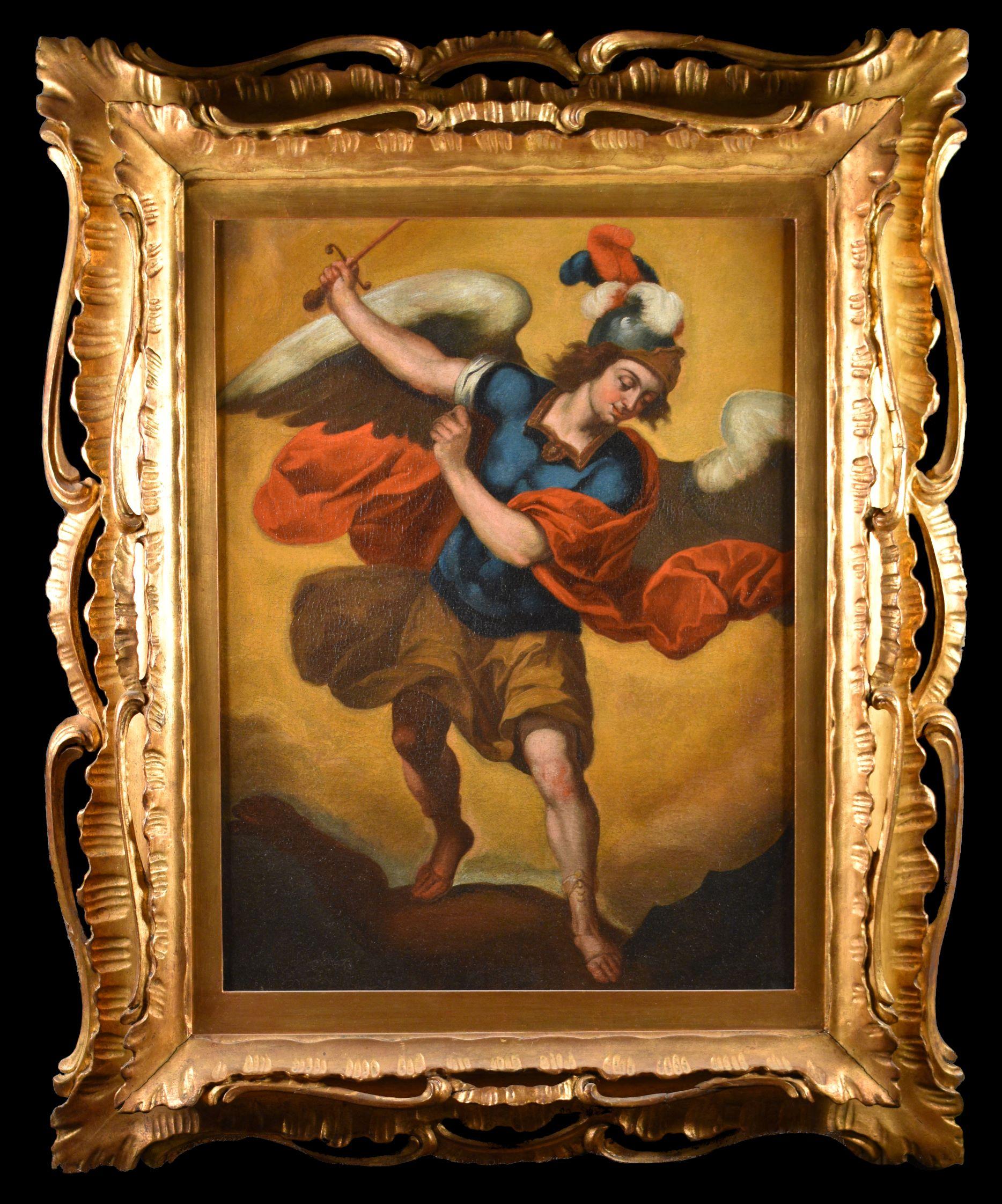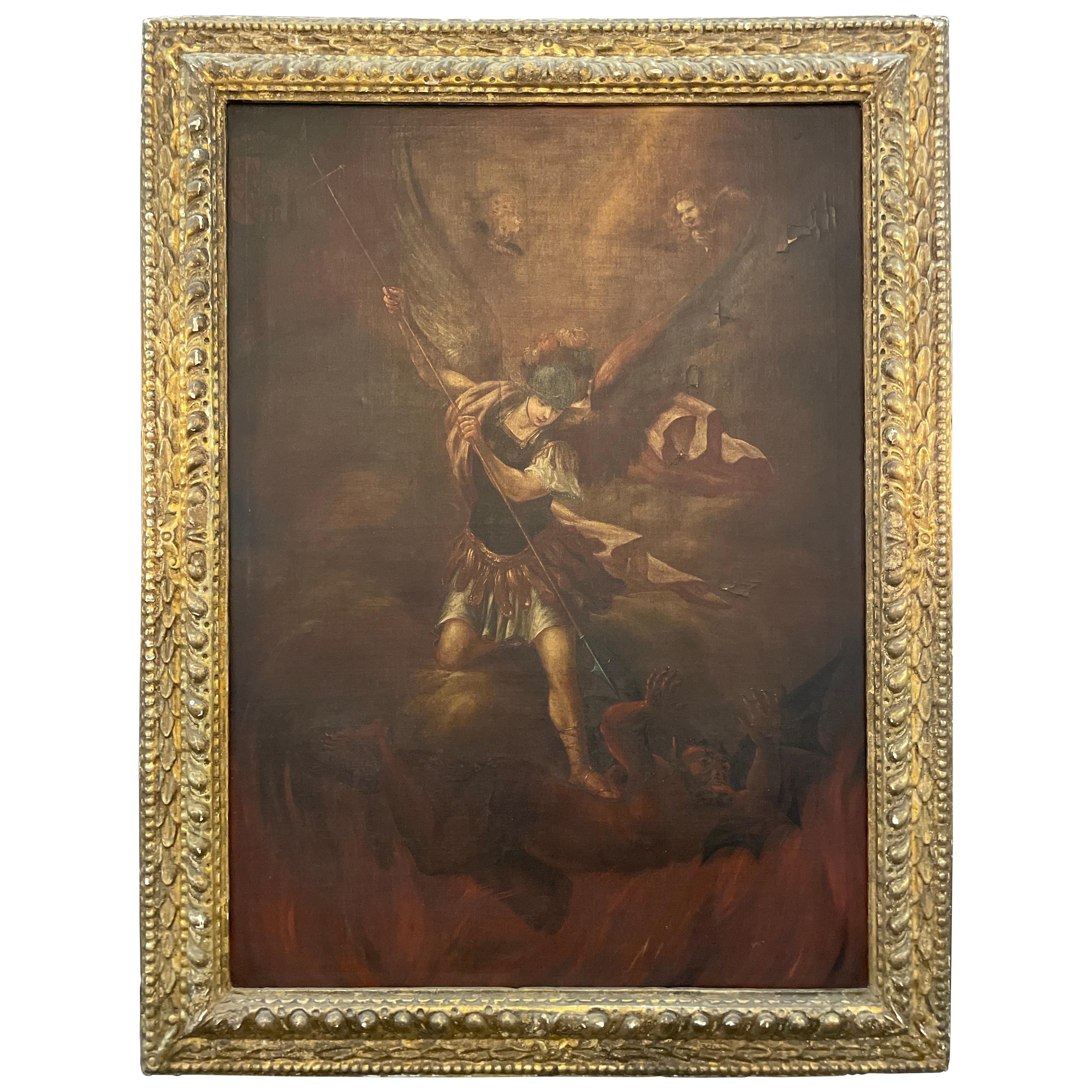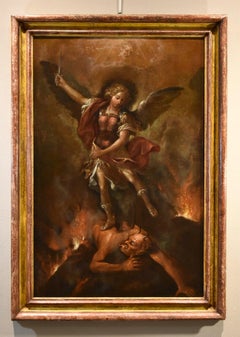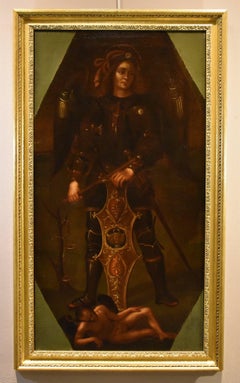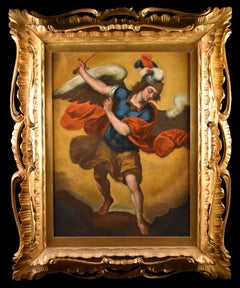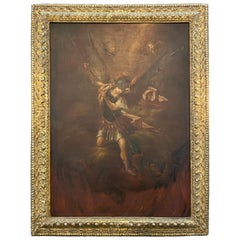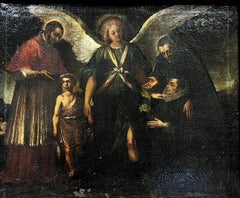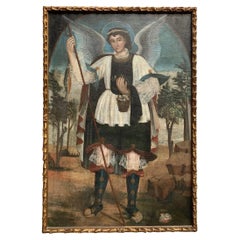Items Similar to Saint Michael Archangel Tuscany school 16th Century Paint Oil on canvas Italy
Video Loading
Want more images or videos?
Request additional images or videos from the seller
1 of 20
Saint Michael Archangel Tuscany school 16th Century Paint Oil on canvas Italy1530-1599
1530-1599
$9,212.24
$11,515.2920% Off
£6,935.40
£8,669.2620% Off
€7,800
€9,75020% Off
CA$12,690.46
CA$15,863.0820% Off
A$14,212.52
A$17,765.6520% Off
CHF 7,415.86
CHF 9,269.8220% Off
MX$173,599.79
MX$216,999.7420% Off
NOK 94,351.30
NOK 117,939.1320% Off
SEK 88,937.41
SEK 111,171.7620% Off
DKK 59,374.66
DKK 74,218.3220% Off
About the Item
Saint Michael the Archangel victorious over the Devil
Tuscany - 16th century
Oil on canvas
68 x 52 cm. - In frame 97 x 78 cm.
Of great character is this interesting St. Michael the Archangel subduing the devil, the work of a Tuscan painter at the height of the 16th century, distinguished by a particularly powerful and solemn mannerist language.
The composition is presented according to the traditional iconographic scheme: the Angel, depicted as a youth of rare beauty, takes up the image of the warrior, strong and delicate at the same time; with outstretched wings he lifts his spear without apparent effort, ready to strike the blow of victory at the rebel angel lying at his feet.
An element that on a collectors' level makes our painting extremely rare, if not unique, is the very particular iconography of the demon with female features. In fact, it appears on the ground, subdued and trampled, as a monstrous hybrid being that is part human and part animal: with the torso of a woman, with prococious breasts, and the tail of a snake.
St Michael grasps its animal arm with his claws as if to display such monstrous features. His serene countenance contrasts with the devil's contorted pose and tense gaze, recalling his wickedness, compared to the beauty of the archangel, symbol of goodness.
Supreme commander of the angelic hosts, he is a harbinger of strong symbolic power, representing the
representing the victory of Good over Evil, although in such iconography we might recognise a broader meaning, that of the victory of virtue over lust and seduction (which has always been personified by woman).
The skilful effect of chiaroscuro, which adds volume and substance to the body emerging from the darkness, is well combined with a brilliant chromatic impasto, with the intense red of St. Michael's cloak, with its elegant sinuous folds.
The conservation condition of the work appears good.
The work is completed by a beautiful gilded wooden frame, not of the period.
ADDITIONAL INFORMATION:
The painting is accompanied by a certificate of authenticity and a descriptive iconographic card.
We take care of and organise the transport of the purchased works, both for Italy and abroad, through professional and insured carriers.
Should you have the desire to see this or other works in person, we will be happy to welcome you to our new gallery in Riva del Garda, Viale Giuseppe Canella 18. We are waiting for you!
Contact us for any information or to arrange a visit, we will be happy to answer you.
- Attributed to:Tuscany - 16th century
- Creation Year:1530-1599
- Dimensions:Height: 38.19 in (97 cm)Width: 30.71 in (78 cm)
- Medium:
- Movement & Style:
- Period:
- Condition:
- Gallery Location:Riva del Garda, IT
- Reference Number:1stDibs: LU988115567522
About the Seller
4.9
Platinum Seller
Premium sellers with a 4.7+ rating and 24-hour response times
Established in 2017
1stDibs seller since 2018
255 sales on 1stDibs
Typical response time: <1 hour
- ShippingRetrieving quote...Shipping from: Riva del Garda, Italy
- Return Policy
Authenticity Guarantee
In the unlikely event there’s an issue with an item’s authenticity, contact us within 1 year for a full refund. DetailsMoney-Back Guarantee
If your item is not as described, is damaged in transit, or does not arrive, contact us within 7 days for a full refund. Details24-Hour Cancellation
You have a 24-hour grace period in which to reconsider your purchase, with no questions asked.Vetted Professional Sellers
Our world-class sellers must adhere to strict standards for service and quality, maintaining the integrity of our listings.Price-Match Guarantee
If you find that a seller listed the same item for a lower price elsewhere, we’ll match it.Trusted Global Delivery
Our best-in-class carrier network provides specialized shipping options worldwide, including custom delivery.More From This Seller
View AllSaint Michael Archangel Roman School 17/18th Century Paint Oil on canvas Italy
Located in Riva del Garda, IT
Saint Michael the Archangel Victorious
Roman painter, 17th-18th century
Oil on canvas 112 x 74 cm In frame 128 x 91 cm
This interesting Saint Michael the Archangel subduing ...
Category
17th Century Old Masters Paintings
Materials
Oil
Saint Michael Archangel Reni 17/18th Century Paint Oil on canvas Old master Art
By Guido Reni (Bologna 1575 - 1642)
Located in Riva del Garda, IT
Saint Michael Archangel
Guido Reni (Bologna 1575 - 1642) Workshop/Follower of
17th-18th century
Oil on canvas (104 x 68 cm. - In frame 109 x 68 cm.)
This high quality painting is b...
Category
17th Century Old Masters Paintings
Materials
Oil
$14,753 Sale Price
20% Off
Saint Michael Archangel 17th Century Paint Oil on canvas Lombard School
Located in Riva del Garda, IT
17th century Lombard painter
Saint Michael Archangel
Oil on canvas
139 x 75 cm. - Framed 156 x 91 cm
Antique painting with St. Michael the Archangel, immortalised full-length as a ...
Category
17th Century Old Masters Paintings
Materials
Oil
$10,563 Sale Price
20% Off
Saint Michael Archangel López 18th Century Paint Oil on canvas Spanish school
Located in Riva del Garda, IT
18th-century Spanish Colonial School
Attributed to Juan Pedro López (Caracas, Venezuela, 1724 - 1787)
Saint Michael the Archangel
Oil on canvas
91 x...
Category
18th Century Old Masters Paintings
Materials
Oil
$8,237 Sale Price
20% Off
Announcing Angel Gabriel Maratta 17th Century Paint Oil on canvas Old master
Located in Riva del Garda, IT
The Announcing Angel Carlo Maratta (Camerano, 1625 – Rome, 1713)Workshop
Oil on canvas 63 x 75 cm. - Gilded wood frame 89 x 75 cm.
Excellent condition, restored, 19th century ...
Category
17th Century Old Masters Paintings
Materials
Oil
$9,457 Sale Price
20% Off
Saint John Baptist 16/17th Century Paint OIl on canvas Old master Tuscany school
Located in Riva del Garda, IT
Florentine painter, 16th-17th century
Saint John the Baptist
Oil on canvas 67 x 56 cm - In frame 98 x 83 cm
In bringing out the sculptural figure of this young Saint John the...
Category
17th Century Old Masters Paintings
Materials
Oil
You May Also Like
Saint Michael the Archangel, Sevillan school
Located in New York, NY
An engraving by Jerónimo Wierix after Marten de Vos's Saint Michael the Archangel (Iglesia de San Miguel, Córdoba) may have been a source f...
Category
17th Century Baroque Figurative Paintings
Materials
Canvas, Oil
$5,440 Sale Price
32% Off
18th Century Spanish Oil Painting On Canvas Of Saint Michael Slaying The Demon
Located in Round Top, TX
Beautifully painted oil on canvas of the Archangel Saint Michael slaying the demon… It’s set in a gold gilt wood carved frame from the same period. Some of the gilded parts show worn...
Category
Antique 18th Century Spanish Paintings
Materials
Canvas, Giltwood
Fine Italian Old Master Oil Painting Angel & Saints Appearing to Figures
Located in Cirencester, Gloucestershire
Artist/ School: Italian Old Master, 18th century
Title: Angel and Saints appearing to figures, one dressed in a white ruff collar.
Medium: oil on canvas...
Category
Early 18th Century Old Masters Figurative Paintings
Materials
Canvas, Oil
18th-century Spanish Colonial oil on canvas depicting Saint Raphael Archangel
Located in Rio De Janeiro, BR
A monumental and captivating 18th-century Spanish Colonial oil on canvas depicting Saint Raphael the Archangel, rendered in grand scale with overall dimensions of 167 cm height by 11...
Category
Antique Mid-18th Century Spanish Colonial Paintings
Materials
Canvas
18th Century Italian "Saint Raphael Archangel" Oil on Canvas with Gilded Frame
Located in Marbella, ES
18th century Italian "Saint Raphael the Archangel" oil on canvas with gilded frame.
Category
Antique Mid-18th Century Italian Paintings
Materials
Canvas, Wood
17th Century By Gian Giacomo Barbelli Paradise and Purgatory Oil on Canvas
Located in Milano, Lombardia
Already been in Koelliker collection (no. inv. LK0431)
Publications:
- C. Alpini, Ritratto di Gian Giacomo Barbelli nel IV centenario della nascita, in “Insula Fulcheria”, XXXIV, ...
Category
17th Century Old Masters Figurative Paintings
Materials
Canvas, Oil
More Ways To Browse
Saint Painting Antique
Tuscany Art
16th Century Italian
Italian Painting Angel
16th Century Italian Art
Saint Michael
Tuscany Painting
Devil Painting
Breast Painting
Italian Paintings 16th Century
Antique Wooden Saints
Angel Wings Art
16th Century Old Master Painting
Gilded Angel
Demon Painting
Oil Paintings Tuscany
Womans Breast
Antique Angel Wings
